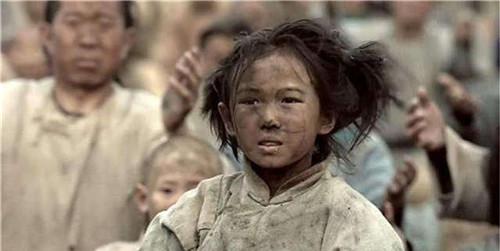The great patriotic poet Du Fu wrote in "Soldier Carriage Line": "Even if there are healthy women who hoe and plow, there is nothing in the acres of grass. The Qin soldiers endured hard fighting and were expelled from dogs and chickens. The poem depicts a miserable picture of the country's war and chaos, and the people are not happy. In ancient Chinese history, whether it is a foreign invasion or a change of dynasties, the word "war" is always inseparable.

Frequent conquests consumed a large amount of labor, coupled with the change of seasons, various natural disasters brought about by climate change, and food supply shortages often occurred in ancient times. Wealthy families often have grain in storage, while ordinary peasant families, rations are solved by the grain harvest of that year, and once there is a natural disaster, they not only have no income, but also cannot even eat.
Jia Yi wrote in the "New Book: No Accumulation": "There is famine in the world, and the world is always there." It can be seen that the famine in ancient times was not once or twice, but a frequent event. From the beginning of the Han Dynasty to the Republic of China, as many as 72 famines have been recorded in the historical records, and the number of people who starved to death because of the lack of food was sometimes even greater than the number of people who died in the war.
Speaking of this, many people will be curious, the grain planted has no harvest, is there something else to eat, today's fishing industry is so developed, ancient people did not know how to catch fish to eat? In fact, on the surface, aquatic products are indeed a major source of food supply when famine occurs, but the problem is that the areas most prone to famine in ancient times were often not developed. According to the places where famines occur in the records, the frequency of famine in the north is much higher than in the south.
In addition to war, which is a major contributor to famine, natural disasters are particularly severe in droughts, floods and locusts. China has always been a large agricultural country, and the climate and soil in the south are better than those in the north, and it is more suitable for the cultivation of most crops. Moreover, the south is rich in water sources, suitable for large-scale cultivation of rice, known as the "land of fish and rice", and most places are relatively rich. Even when waterlogging occurs, it often does not turn into a famine tragedy.
In the north, the climate is arid, and it is common for dozens of days without rain, and the irrigation of farming relies on ponds and some small streams. In the event of a drought, not only does the land dry up, the crops are not harvested, and the few rivers and lakes are dried up, so there is no such thing as fishing.
In the "Zizhi Tongjian" record, during the reign of Emperor Xian of Han, there was a national famine, the cause was that locusts were rampant, crops were eaten, this famine is the most serious in history, not only the people throughout the country are scattered, and even rumors have appeared in some areas of the tragedy of cannibalism.
In general, the famine we often hear about the situation that causes the people to eat turf generally occurs in the north, in addition to the lack of water itself, which leads to underdeveloped fishing, the eating habits of northerners make them less aware of fishing. So when famine comes, in addition to hunting, collecting wild fruits and grass root bark is a more common means of survival for northerners.
Today, the modernization of China's agriculture has been greatly developed, and China is now the world's largest grain producing country, and the people are living in plentiful lives and will no longer worry about food shortages. Behind this change, I have to mention a person, he is Yuan Longping, an academician of the Chinese Academy of Sciences.
Elder Yuan once said in an interview with reporters that grain can save a country or trip up a country. He had seen people starve to death during the famine of the 1960s, so he devoted his life to the study of hybrid rice. When asked by reporters if he was particularly afraid of another famine in China, Mr. Yuan said with tears in his eyes: "It is impossible." ”